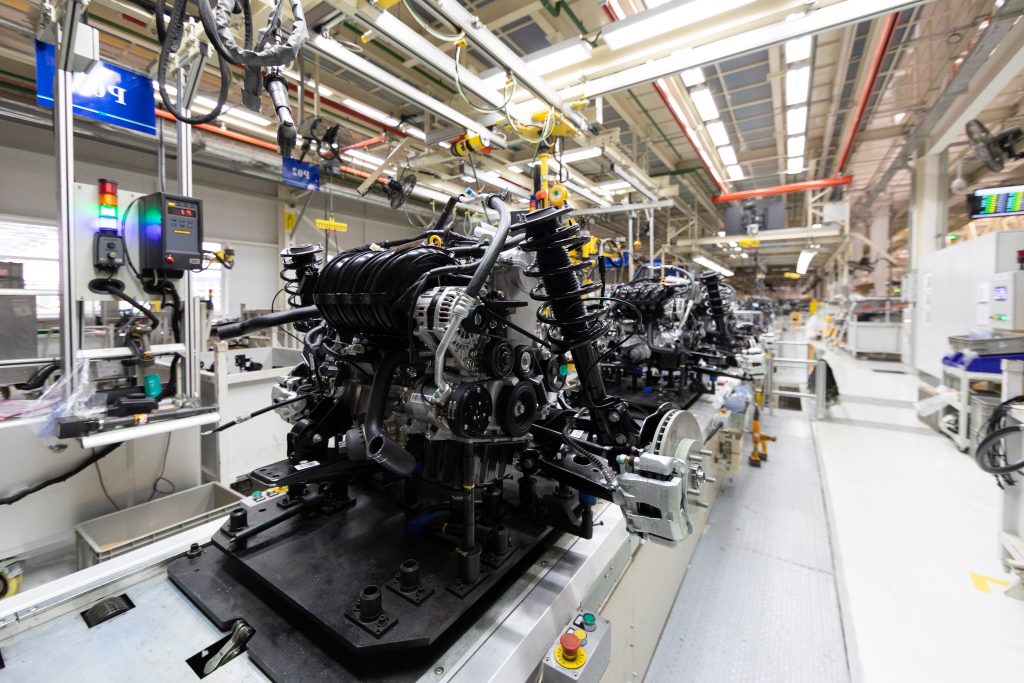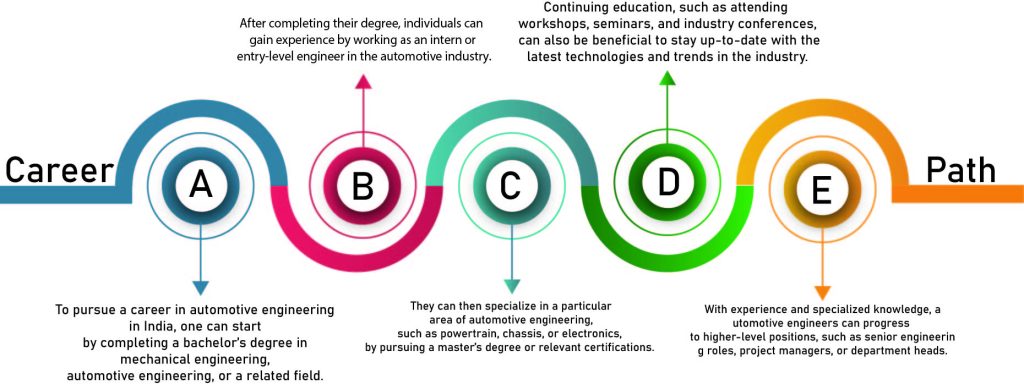Automotive engineering is a branch of mechanical engineering that deals with the design, development, manufacturing, and maintenance of vehicles. It involves the application of scientific principles, mathematical formulas, and computer-aided design tools to create and improve various aspects of vehicles, such as their structure, engines, suspension systems, braking systems, safety features, and fuel efficiency. Automotive engineers work with other professionals, such as designers, technicians, and suppliers, to ensure that vehicles meet the desired performance, reliability, and safety standards.

Work description
Automotive engineers work on a variety of tasks related to the design, development, testing, and production of vehicles.
They use their knowledge of mechanics, electronics, and materials science to design and develop new vehicle components and systems, such as engines, transmissions, suspension systems, and electronic control modules.
They also conduct testing and simulation activities to ensure that the vehicle meets the desired performance, safety, and environmental standards.
Automotive engineers work in teams and collaborate with other professionals, such as designers, technicians, and suppliers, to bring their designs to life.
Additionally, they need to stay up-to-date with the latest industry trends and regulations, as well as possess strong communication, problem-solving, and project management skills.
Improved vehicle performance
Automotive engineers design and develop various vehicle components and systems, such as engines, transmissions, and suspension systems, to improve vehicle performance, fuel efficiency, and reliability.
Enhanced safety features
Automotive engineers work on developing and improving safety features such as airbags, anti-lock brakes, and electronic stability control, which have reduced the number of fatalities and injuries in car accidents.
Development of new technologies
Automotive engineers are involved in the development of new technologies, such as electric and hybrid powertrains, autonomous driving systems, and advanced driver assistance systems, which have the potential to revolutionize the automotive industry.
Career opportunities
Automotive engineering offers a wide range of career opportunities, from design and development to testing and manufacturing. It also provides opportunities to work in various areas, such as motorsports, aerospace, and defense.
Contribution to society
The work of automotive engineers has a significant impact on society, as it plays a vital role in the transportation industry, which is essential for the economy and daily life. Additionally, the development of new technologies and environmentally friendly solutions can contribute to reducing the impact of vehicles on the environment.
High competition
The automotive industry is highly competitive, and automotive engineers need to stay up-to-date with the latest trends and technologies to remain competitive in the job market.
Environmental impact
The automotive industry is one of the largest contributors to greenhouse gas emissions, and automotive engineers need to work on developing environmentally friendly solutions to reduce the impact on the environment.
Economic fluctuations
The automotive industry is sensitive to economic fluctuations, and automotive engineers may face job insecurity during economic downturns.
Safety concerns
Despite advances in safety technology, the automotive industry still poses risks to drivers, passengers, and pedestrians. Automotive engineers need to work on developing even safer vehicles.
Cost considerations
Automotive engineering involves a significant investment in research and development, and the cost of developing new technologies and features can be high, which may lead to higher vehicle prices.
The cost of pursuing a career in automotive engineering in India can vary depending on several factors, such as the type of institution, program duration, and the level of study. Typically, pursuing a bachelor’s degree in automotive engineering from a top-tier institution in India can cost around INR 5-10 lakhs per year, while a master’s degree can cost around INR 3-7 lakhs per year. It is important to note that the cost of pursuing a degree in automotive engineering from a government college and a private college may vary. The cost of living expenses, such as accommodation, food, and transportation, can also add to the total cost.
[wpcharts type=”horizontalbarchart” bgcolor=”red:gray:yellow,blue:gray:yellow,random:gray:yellow,purple:gray:yellow” min=”0″ legend=”true” titles=”2 year , 5 year” values=”3,7,5,12″]
The earning potential of an automotive engineer in India can vary depending on several factors, such as experience, skills, industry, and location.
According to PayScale, the average salary for an automotive engineer in India is around INR 5-10 lakhs per year, while a mid-career automotive engineer with 5-10 years of experience can earn around INR 10-20 lakhs per year.
However, those with more experience or working in higher-level positions, such as senior engineering roles or management positions, can earn significantly more.
The industry and location can also affect the earning potential, with automotive engineers working in the private sector or in metropolitan cities often earning higher salaries than those in the public sector or smaller towns.
[wpcharts type=”horizontalbarchart” bgcolor=”red:gray:yellow,blue:gray:yellow,random:gray:yellow,purple:gray:yellow” min=”0″ legend=”false” titles=”Entry-Level, Mid-Career, Senior-Level ” values=”5,15,25,35,45,55″]
Automotive engineering involves analyzing complex problems and developing innovative solutions, so a student should have excellent analytical and problem-solving skills.
Automotive engineering requires creativity and innovation to develop new and improved systems and technologies.
Automotive engineering involves working collaboratively with a team of professionals, so a student should have strong communication and teamwork skills.
Automotive engineering involves complex calculations and the application of physics principles, so a student should have a strong foundation in mathematics and physics.
A strong interest in cars and the automotive industry can be an advantage in pursuing a career in automotive engineering.
Automotive engineering requires precision and attention to detail, so a student should avoid being careless or making mistakes due to a lack of attention.
A weak foundation in mathematics and physics can be a disadvantage in pursuing a career in automotive engineering.
Poor communication skills can hinder teamwork and collaboration in the automotive industry.
Automotive engineering is a dynamic and constantly evolving field, so a student should be open to change and innovation.
A lack of interest in automobiles or the automotive industry can make it difficult to stay motivated and committed to pursuing a career in automotive engineering.
Impatience or inability to work through complex problems.
Tendency to procrastinate or miss deadlines.
Work-life balance
The work-life balance of an automotive engineer can vary depending on their job responsibilities, work environment, and industry. Some automotive engineers may work long hours or have tight deadlines, while others may have a more flexible schedule.
In general, automotive engineers may need to work overtime or on weekends to meet project deadlines, especially during the development and testing phase of new products.
However, many companies in the automotive industry also provide work-life balance initiatives such as flexible work hours, telecommuting options, and wellness programs to support the health and well-being of their employees. Ultimately, it is up to the individual automotive engineer to manage their workload and prioritize their personal life to achieve a healthy work-life balance.

Automotive engineering can contribute to the development of more sustainable and environmentally friendly vehicles, reducing pollution and carbon emissions.
The automotive industry provides job opportunities for a large number of people, including engineers, designers, technicians, and support staff.
Advancements in automotive engineering have improved vehicle safety, reducing the number of accidents and fatalities on the roads.
Automotive engineering has enabled the development of more efficient and reliable transportation systems, improving access to essential services and products.
The automotive industry plays a significant role in the global economy, contributing to the growth of national and international markets.
Powertrain engineering
This specialization focuses on the design and development of engines, transmissions, and drivetrain systems for vehicles.
Electronics and software engineering
This specialization focuses on the development of electrical and electronic systems for vehicles, including advanced driver assistance systems, infotainment systems, and vehicle networking.
Materials engineering
This specialization involves the development and testing of new materials for vehicle components to improve their performance, durability, and sustainability.
Manufacturing engineering
his specialization involves the design and optimization of manufacturing processes and equipment for automotive production, including assembly lines, robotics, and automation.
Conclusion:
In conclusion, a career in automotive engineering can be a challenging and rewarding choice for those with a passion for automobiles, innovation, and problem-solving. The field offers a wide range of opportunities for specialization and career growth in India, with many companies investing in the development of sustainable and advanced vehicle technologies. With the right combination of education, training, and experience, automotive engineers can make significant contributions to the industry and society, shaping the future of transportation and mobility.



